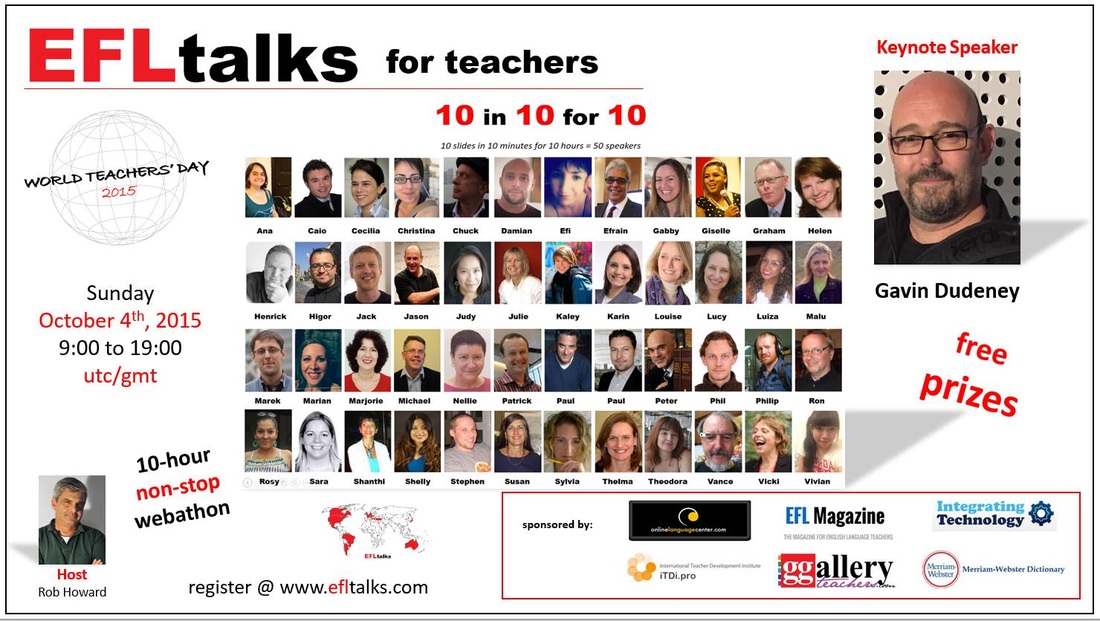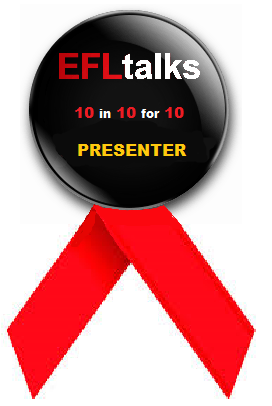|
SPEAKING IS NEVER PRACTISED ENOUGH at any level and one of the easiest ways to do so while also REVISING VOCABULARY and TENSES is to take a pack of flashcards such as JOBS to represent people, take a pack of VERBS such as CHORES around the house and get students to turn over one of each card creating very SIMPLE FUN SENTENCES:
Cards: BAKER / HOOVER the living room Student 1: WHERE DOES a baker WORK? Student 2: A baker WORKS in a bakery. BUT the baker isn't working now. Student 1: WHAT's the baker DOING? Student 2: She's HOOVERING the living room. Cards: DANCER / HANG the laundry Student 1: WHERE DOES a dancer WORK? Student 2: A dancer DANCES in a theatre. BUT the dancer isn't dancing now. Student 1: WHAT's the dancer DOING? Student 2: He's HANGING the laundry. As you can see, it's good to practise affirmatives, negatives, questions, continuous tenses etc. Depending on which cards randomly appear, amusing sentences may be created. You can practise other tenses, too: Cards: BUTCHER / IRON the laundry Student 1: WHAT DID the baker DO yesterday? Student 2: He DIDN'T WORK in the bakery. He IRONED the laundry. Cards: POLICEMAN / MAKE the beds Student 1: WHAT HAS the chemist DONE today? Student 2: He HASN'T WORKED at the police station. He HAS MADE the beds. Cards: HOUSEWIFE / DO the gardening Student 1: WHAT IS the housewife GOING TO DO? Student 2: He ISN'T GOING TO WORK in the house. She'S GOING TO DO the gardening. The OBJECTIVE is to help students make sentences speaking and PRACTISE THROUGH REPETITION rather than through grammatical explanations. Using the language is the best way for students to learn it. You can also introduce frequency adverbs with a dice to add fun and practise. Please write any other ideas you may have in the comments box below. A FUN ALTERNATIVE is to SPIN the WHEELS below to create RANDOM sentences. (Make your own wheels at Wheeldecide.com) I hope these ideas were useful for you! Susan
1 Comment
thereby unleashing their creativity, hiding their shyness to speak English behind the characters of the cartoon.Image credit: https://toontastic.withgoogle.com Hi teachers and language students! Have you ever heard of TOONTASTIC? Today I'm really excited to present to you TOONTASTIC, which I discovered very recently. It's an excellent app that you download on your phone. You then ask students to prepare, either spontaneously or with a script, a small sketch in which they take advantage of all the fun activities that are available on this to create a short story. It's very exciting, very easy to use, can be used offline as well and I'd like to give you some examples of what some of my students created in the video below. The very young students under age six need a lot of help with laying out the story and practising what to say before recording the one-minute scenes but older students are able to do it all by themselves. I also use this with some high school students and they can explain a scientific experiment, a historical event or represent a topic, as some 10-year olds did recently, by inventing a sketch on bullying which was very effective to convey an important message. Image credit: https://toontastic.withgoogle.com There are three possibilities: a 3-scene sketch called Short Story, a 5-part sketch called Classic Story or a 5-part Science Report. The students can use the characters proposed as they stand, customise them changing their colours, adding photos of the students' faces on them or drawing the characters themselves. For language learning purposes I ask them not to waste time on changing the characters because our objective is practising the English language. There are various settings to ignite the students' imaginations and in each setting many exciting things happen such as the cannonball shooting out when ignited, the volcano exploding when touched, the cable-car starting and stopping, doors opening and closing, all activated by the students touching various parts of the settings. The characters themselves also have exciting surprises such a those whose parachute opens, those whose tongue licks out unexpectedly and so on. As you can see, it's a very flexible app that can be used by all ages and what's exciting is that even shy students can speak because they hide behind the character and it really gets people talking. So the most interesting characteristic of this application is that we're getting students to finally speak and speak spontaneously. That's why I don't correct every mistake they make because it's better for them to become confident making a few mistakes than correcting every grammar point and then being shy to speak. So I definitely recommend TOONTASTIC. Have fun with it, try it out and as you can see, at the end it really turns out like a real film: they also show who made it which makes it a little more fun and realistic - directed by... starring... etc. Please write your experiences with the app in the comments below. It will be really interesting to hear all the different ways you use this app. Hoping to have shared some useful information. Your fluency teacher, Susan Images credit: https://toontastic.withgoogle.com Today I'm here to talk to you about how graded readers can improve your English. Now I know you are always very busy and that reading is something you can't do whilst you're doing other activities. However, there is a fantastic website which I'd like to recommend to you because you can download an e-book absolutely free and you can download the audio accompanying it. That means you use the audios whilst you're driving to work and you have the PDF or even mobi for kindle or epub for Apple devices so that you can read them, too. You can read these books and whilst you're listening or you can listen and read separately but the fact that you're using your ears to listen and your eyes to read these are two senses which will help you consolidate the expressions such as phrasal verbs, vocabulary, the idioms and the grammatical construction of a sentence. This means you won't have to use traditional text-books to practice your English because you'll be picking it up very naturally as if you were in full immersion. That's why I recommend you read a lot but these books are especially good because they are graded according to levels and this means you'll start with a low level and you won't have the frustration that it's too difficult for you. Then as you improve, as you experience success, you'll be motivated to go to the next level and if you do it very gradually you'll notice the improvement very, very quickly and English will become very natural for you. It'll actually be very good if you sometimes stop an audio and then just repeat it with the same intonation and so also improve your fluency. The website is called https://english-e-reader.net and these are graded readers. You can download them or read them online for FREE. The website is divided into elementary, pre-intermediate, intermediate, upper-intermediate and advanced. These adapted books are one of the best and most interesting ways to increase your vocabulary and improve all your English skills quickly and easily. There is a very wide choice of books of all kinds from classics to quite modern books so you can really choose anything. Every book will show you the book cover, give you a small description of what the story is about, tell you how many total words there are and how many unique words. It'll also give you a few words that you may not know. What's exciting is that you can also download the mp3 versions so that you get them all. I think it's quite exciting actually because you can also have the audios to listen to when you don't have time to read. That way you make sure you are 'reading' a little every day but also practicing your listening skills. There are lots of audiobooks on the web but very often they've been it read by volunteers and they're not a very professional nor particularly exciting. Instead these are really read by professional actors in an exciting way with background music to give the atmosphere just like in films. That's why I recommend this website rather than other ones because at NO COST you have a really professional audio. I suggest you use this website so that you can improve your English by practicing daily listening, reading or listening and reading together. Tell me if this suggestion was useful to you and I'd love you to comment in the box below how you get along with them. Your fluency teacher, Susan Chants are a very repetitive way of embedding expressions in the brain so that they become second-nature and just 'sound right' without having to resort to learning grammar rules and translating from one's own language with the inevitable often horrific results. I have been setting expressions to music and rhythmic chants for decades with excellent results. What did you do today? is an action song for kids, which, through repetition, teaches the question form in the past simple tense, the answer with relative prepositions, shop vocabulary, infinitive of purpose and prepositions with transport. The idea is that you fix these expressions through repetitive chants so that they flow from your mouth spontaneously when you are speaking, without having to think. After having written and recorded a video of the song I realised it contradicts my lessons on the Present Perfect Tense always being used with 'today', 'this week' etc. and according to the grammar books you shouldn't use 'today' with the Simple Past Tense. This proves that a language is alive and more flexible than the rigid rules of a grammar book because the sentence is completely natural and widely used. The explanation lies in the fact that this question is asked at the end of the day when the events have already taken place and therefore are considered to be in a period which is completely finished, therefore using the Simple Past Tense despite the word 'today'. I hope you have fun with this repetitive chant. You can download the worksheet to the song below. Hope it's useful! Susan
|
Categories
All
Would you like regular English learning & teaching ideas? Subscribe to my blog so you don't miss a post!
AuthorMy name is Susan Brodar, born in London into a multilingual family and brought up bilingual English / Italian. Archives
December 2018
|
||||||

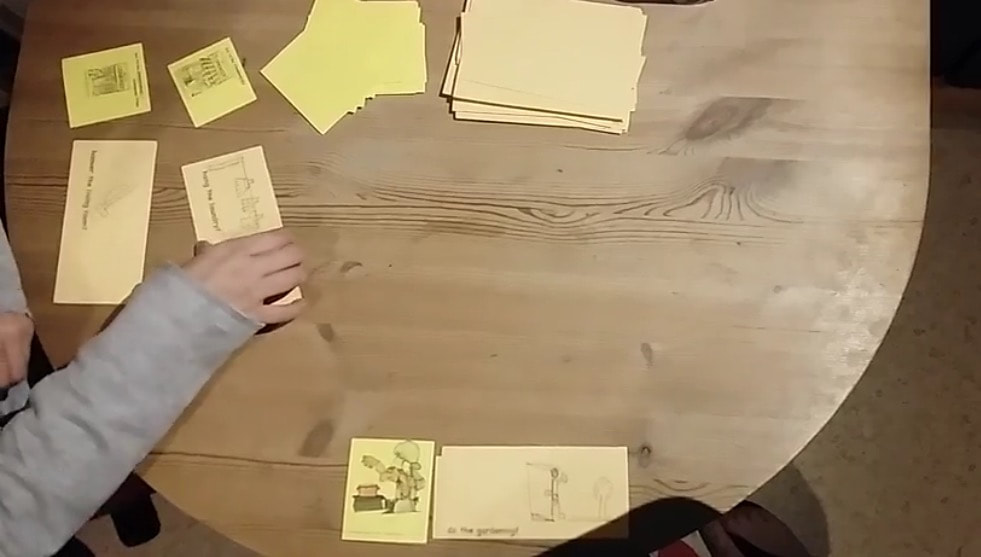
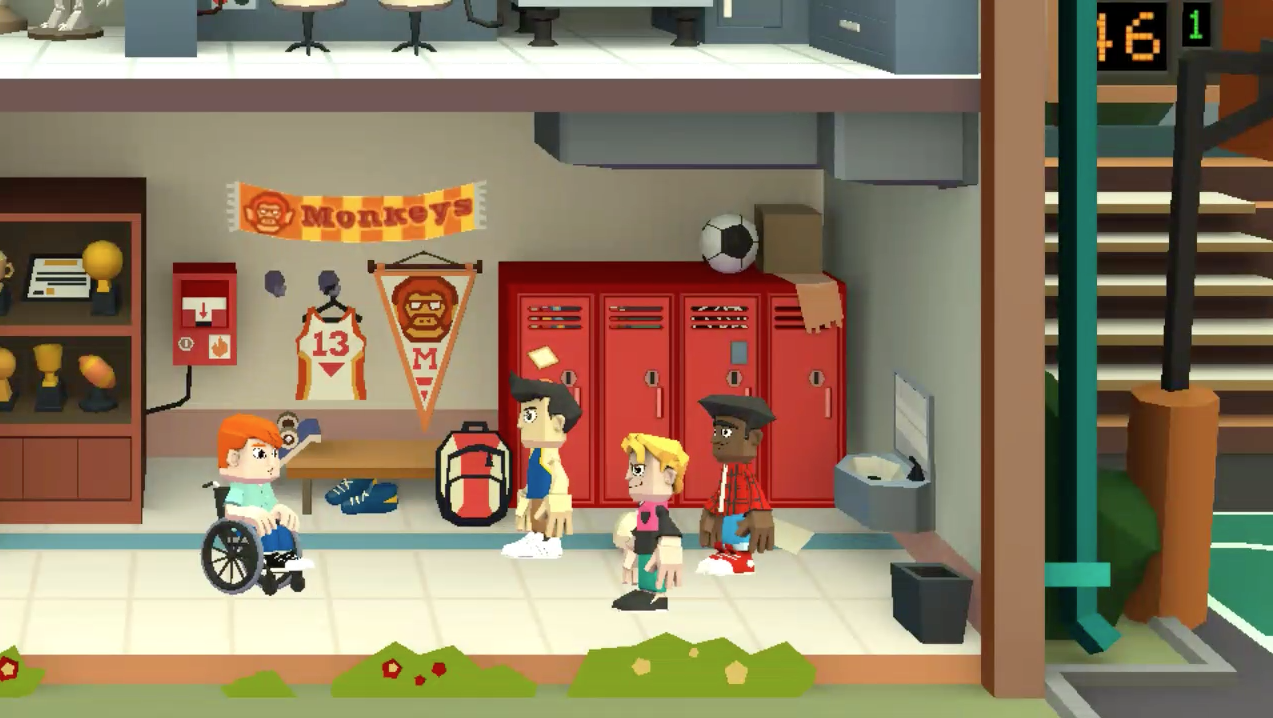
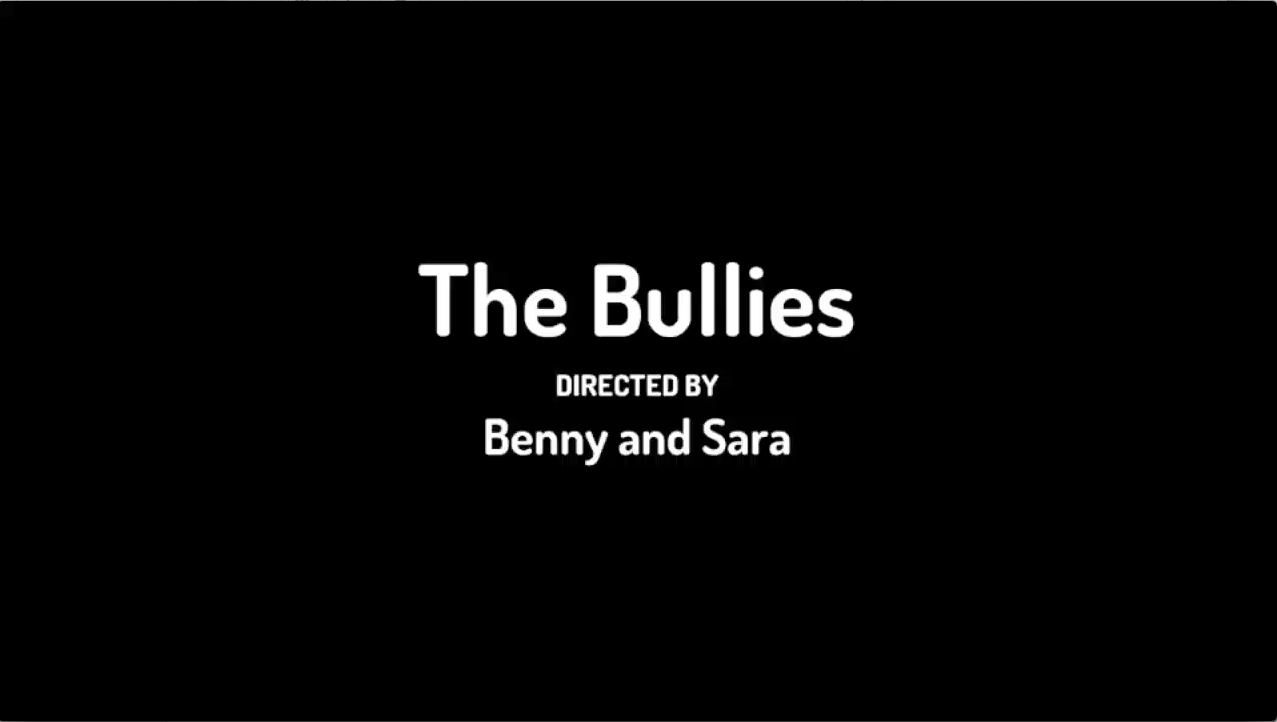
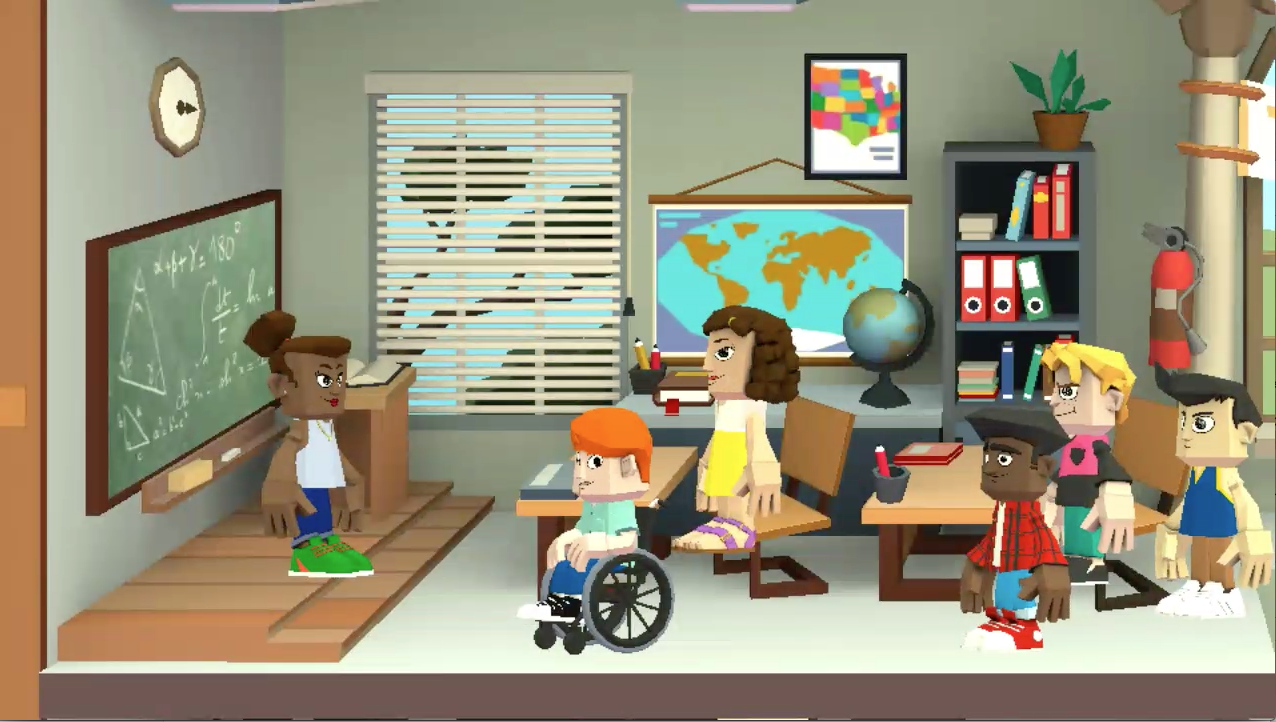
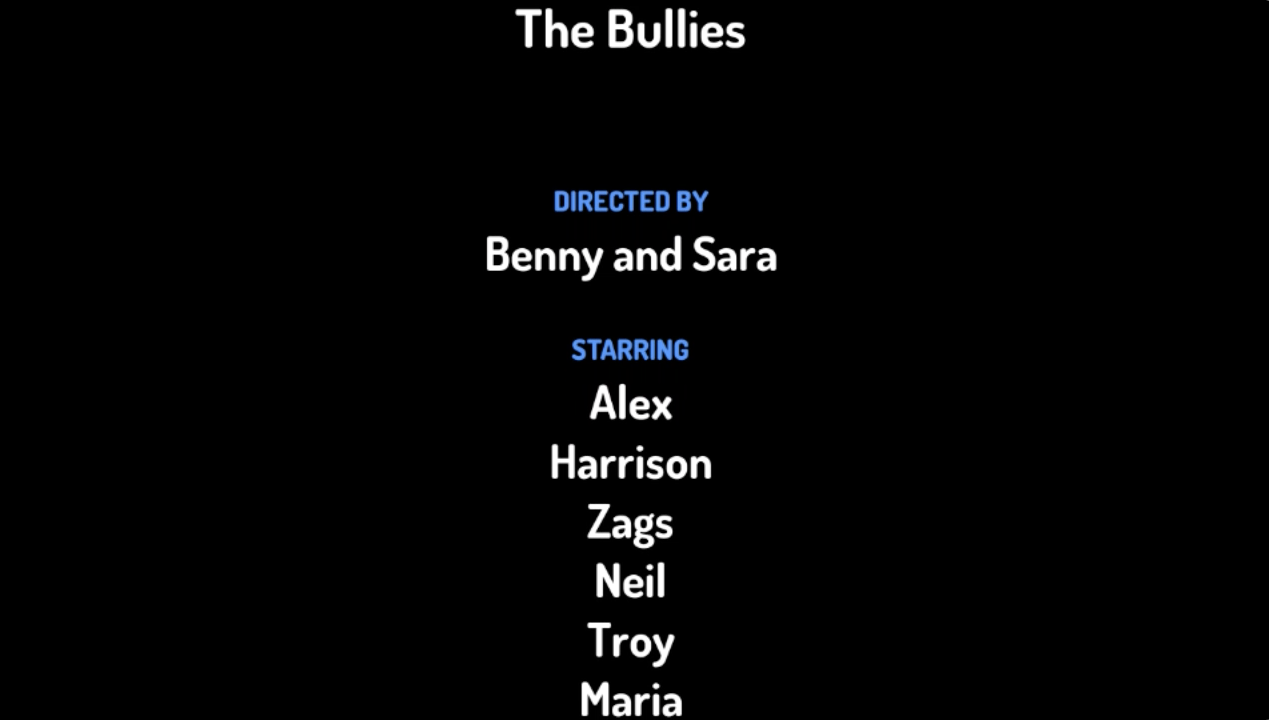
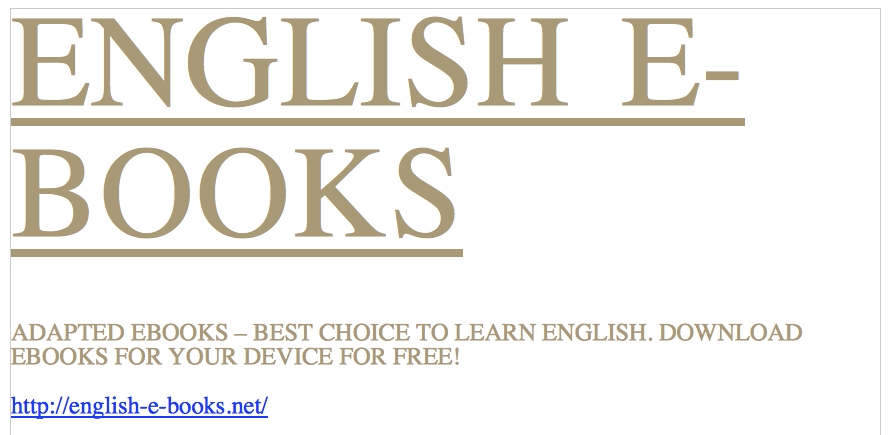
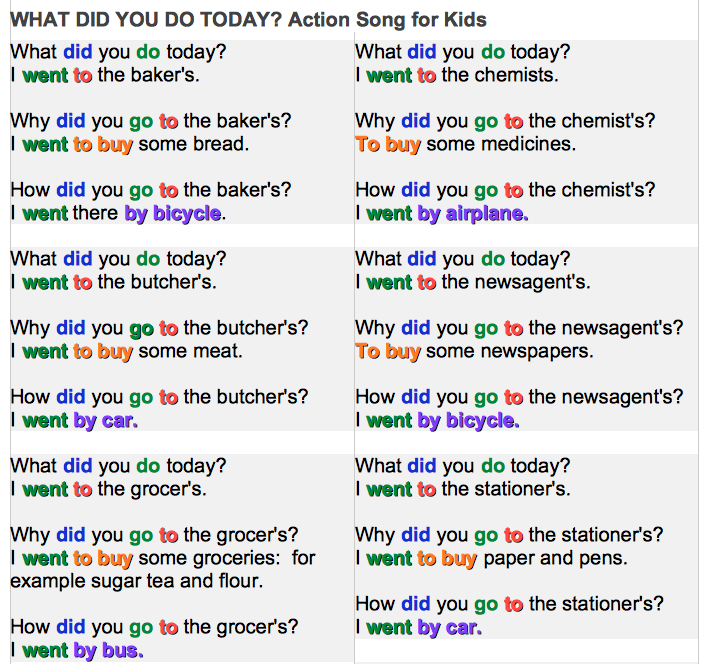

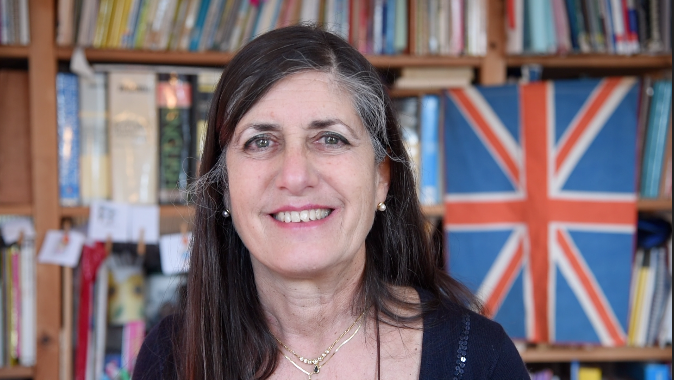

 RSS Feed
RSS Feed
